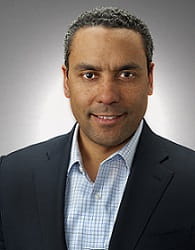
4/26/2022
PITTSBURGH - A prognostic model developed by University of Pittsburgh School of Medicine data scientists and UPMC neurotrauma surgeons is the first to use automated brain scans and machine learning to inform outcomes in patients with severe traumatic brain injuries (TBI).
In a study reported today in the journal Radiology, the team showed that their advanced machine-learning algorithm can analyze brain scans and relevant clinical data from TBI patients to quickly and accurately predict survival and recovery at six-months after the injury.
“Every day, in hospitals across the United States, care is withdrawn from patients who would have otherwise returned to independent living,” said co-senior author David Okonkwo, M.D., Ph.D., professor of neurological surgery at Pitt and UPMC. “The majority of people who survive a critical period in an acute care setting make a meaningful recovery—which further underscores the need to identify patients who are more likely to recover.” 
It often takes two weeks for TBI patients to emerge from their coma and begin their recoveries—yet severe TBI patients are often taken off life support within the first 72 hours after hospital admission. The new predictive algorithm, validated across two independent patient cohorts, could be used to screen patients shortly after admission and can improve clinicians’ ability to deliver the best care at the right time.
TBI is one of the most pressing public health issues in the U.S.—every year, nearly 3 million people seek TBI care across the nation, and TBI remains a leading cause of death in people under the age of 45.
Recognizing the need for better ways to assist clinicians, the team of data scientists at Pitt set out to leverage their expertise in advanced artificial intelligence to develop a sophisticated tool to understand the nature of each unique patient’s TBI.
“There is a great need for better quantitative tools to help intensive care neurologists and neurosurgeons make more informed decisions for patients in critical condition,” said corresponding author Shandong Wu, Ph.D., associate professor of radiology, bioengineering and biomedical informatics at Pitt. “This collaboration with Dr. Okonkwo’s team gave us an opportunity to use our expertise in machine learning and medical imaging to develop models that use both brain imaging and other clinically available data to address an unmet need.”
Led by the co-first authors Matthew Pease, M.D., and Dooman Arefan, Ph.D., the group developed a custom artificial intelligence model that processed multiple brain scans from each patient and combined it with an estimate of coma severity and information about the patient’s vital signs, blood tests and heart function. Importantly, because brain imaging techniques evolve over time and image quality can vary dramatically from patient to patient, the researchers accounted for data irregularity by training their model on different image-taking protocols. 
The model proved itself by accurately predicting patients’ risk of death and unfavorable outcomes at six months following the traumatic incident. To validate the model, Pitt researchers tested it with two patient cohorts: one of over 500 severe TBI patients previously treated at UPMC and the other an external cohort of 220 patients from 18 institutions across the country, through the TRACK-TBI consortium. The external cohort was critical to test the model’s prediction ability.
“We hope this research shows that AI can provide a tool to improve clinical decision-making early when a TBI patient is admitted to the emergency room, towards yielding a better outcome for the patients,” said Wu and Okonkwo.
Additional authors of this paper include Ava Puccio, Ph.D., Kerri Hochberger, Enyinna Nwachuku, M.D., Souvik Roy, and Stephanie Casillo, all of UPMC; Jason Barber and Nancy Temkin, Ph.D., of the University of Washington; and Esther Yuh, M.D., of the University of California, San Francisco and group-author investigators from the TRACK-TBI Consortium.
This research was supported by National Institutes of Health National Cancer Institute (grant R01CA218405), National Institute of Neurological Disorders and Stroke (grant U01 NS1365885 and U01 NS086090), Department of Defense (grants W911QY-14-C-0070, W81XWH-18- 2-0042, W81XWH-15-9-0001 and W81XWH-14-2-0176), Radiological Society of North America
Research Scholar grant RSCH1530, Amazon Machine Learning Research Award and the Congress of Neurological Surgeons Data Science Fellowship grant.
PHOTO DETAILS: (click images for high-res versions)
Top right photo:
CREDIT: UPMC
CAPTION: David Okonkwo, M.D., Ph.D.
Bottom right photo:
CREDIT: UPMC
CAPTION: Shandong Wu, Ph.D.
















